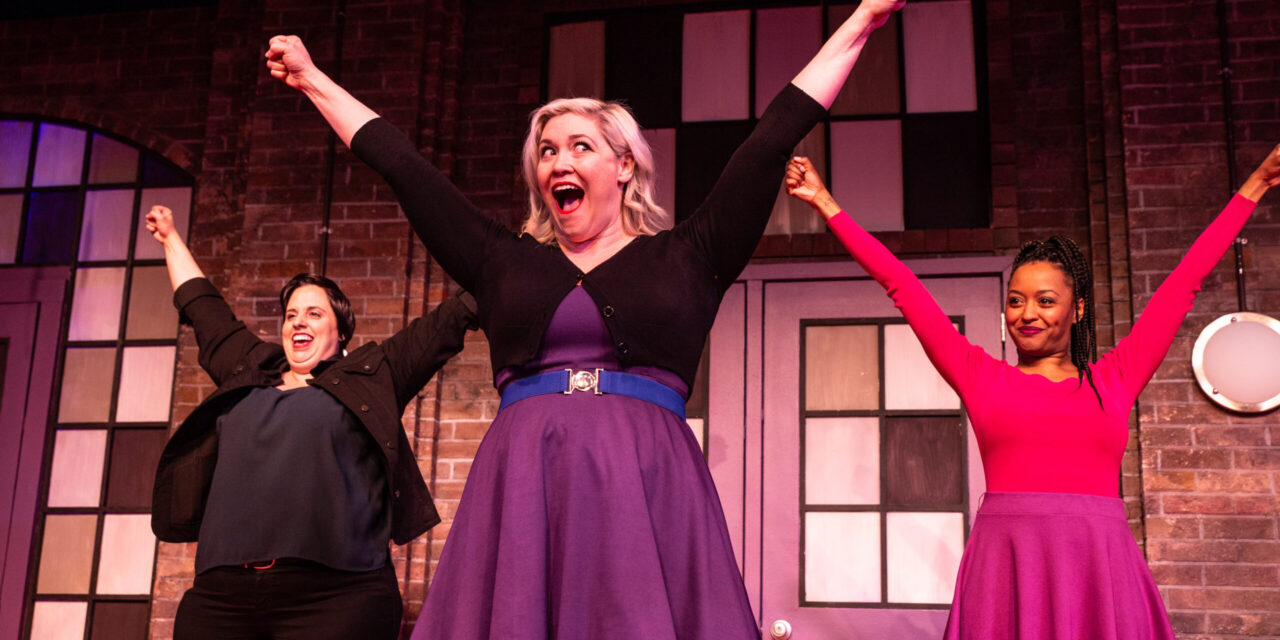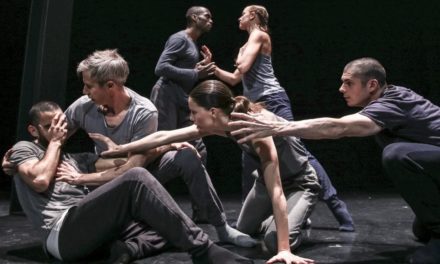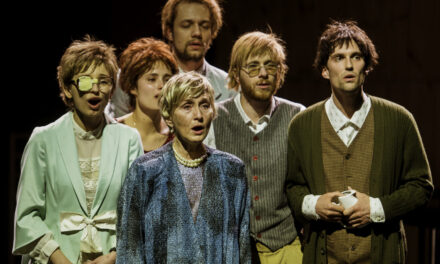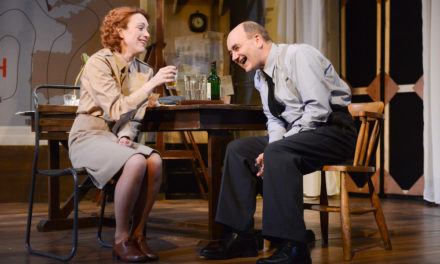Visiting the city of Boston during its national tour, the Second City sketch revue She The People: Girlfriends’ Guide to Sisters Doing it for Themselves has landed at the Huntington Theatre Company. Originating in Chicago, the show has played in multiple versions for two years, but that does not mean its comedy is stale. With a fresh cast and fresh material, the company has updated the jokes and sketches to match the times. As such, its satire feels both timeless and ever-present.
The talented ensemble of six women (Lexi Alioto, Jess DeBacco, Kazi Jones, Lori McClain, Shelby Plummer, and Yazmin Ramos) make fun of all manner of issues affecting women, including body image, consent, representation in politics, aging, slut-shaming, and so much more. It is unapologetically political in its confrontation of these concerns. It takes a liberal, progressive, and feminist stance as it skewers the patriarchal, societal, structural, and social issues that oppress women. For that reason, the comedy offers a bit of catharsis alongside laughs. Many moments elicit what Seth Meyers calls “clapter,” the kind of applause and cheers of approval from the audience that shows they agree with the argument of the joke. Meyers coined the term disparagingly (if the audiences is clapping, they aren’t laughing), but that’s not the case here. The audience claps because they are thrilled to see this kind of message on stage and, more importantly, in comedy. And they laugh, too. A lot.
The material covers a lot of ground, both in terms of form (sketch, music, improv) and content. One moment, we see three women play a board game akin to Life, but the cards they draw reflect their respective privilege or lack thereof. A straight white woman (Alioto) seems to earn unyielding success and fortune, while the other two, one gay (Plummer) and the other black (Jones), find disproportionate punishments on a sliding scale of inequity, no matter how many times they shuffle the deck. Another sketch features a trio of cheerleaders who are celebrating the raw violence of their team, chanting “Winners like us don’t need consent!” When their coach asks them where they heard such a motto, they reply, in unison, “The president!” We hear a series of parodic songs with funny choruses such as “Maybe your baby is gay,” and another that repeats the refrain “I’m sorry,” over and over again. We also find funny premise-based sketches such as “I’m a woman in a commercial” and “I’m a woman in a movie” which incisively mock the all too prevalent stock-types found in these mediums.
The ethos of the show is stated clearly throughout. During a transition, one cast member tells the audience the show is “theatre by women for everyone,” and even adapts the phrase to draw the audience in: “This is theatre for everyone by you!” As such, they bring an audience member on stage to play a game called “You outta know!” in which the trivia probes the contestants on how much they know about pressing social and political issues. Another game, called “Drop Line,” allows the audience to fill in the dialogue of the scene with phrases they’ve heard from ex-boyfriends, other women, or things they say to inspire themselves. At another moment, the cast polls the audience on which issues matter most to them and call a senator, in this case, Senator Elizabeth Warren, and rally the audience to chant “Protect people, not guns.”
In addition to the edgy satire and sometimes raucous and irreverent humor, the show manages to find moments of pathos as well. One scene set at a Weight Watchers meeting confronts an apprehensive woman with a brash twelve-year old who (seemingly) has yet to internalize the cruel things said about her body. The sketch tugs at the heartstrings just as it earns some of the biggest laughs of the night.
Although there are moments that are funny because they are true, there are others that are so true that they aren’t funny. The cast hedges this line on purpose, to challenge the audience to consider the issues, just as they brilliantly find ways to subvert the tension, to turn issues upside down, and to catch us off guard with a fresh take or a bizarre character. The show also feels local, even though it has been imported from Chicago. References to Boston landmarks such as Boston University, Wellesley, and Newton abound. As such, the comedy feels catered immediately to the audience, making the show feel like a communal celebration of femininity, the kind that any fan of comedy can enjoy.
Original director and head writer Carly Heffernan. Resident director and choreography Carisa Barreca. At the Calderwood Pavillion at the Boston Center for the Arts, 527 Tremont Street.
This post was written by the author in their personal capacity.The opinions expressed in this article are the author’s own and do not reflect the view of The Theatre Times, their staff or collaborators.
This post was written by Matthew McMahan.
The views expressed here belong to the author and do not necessarily reflect our views and opinions.


















